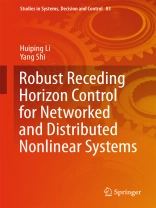This book offers a comprehensive, easy-to-understand overview of receding-horizon control for nonlinear networks. It presents novel general strategies that can simultaneously handle general nonlinear dynamics, system constraints, and disturbances arising in networked and large-scale systems and which can be widely applied. These receding-horizon-control-based strategies can achieve sub-optimal control performance while ensuring closed-loop stability: a feature attractive to engineers.
The authors address the problems of networked and distributed control step-by-step, gradually increasing the level of challenge presented. The book first introduces the state-feedback control problems of nonlinear networked systems and then studies output feedback control problems. For large-scale nonlinear systems, disturbance is considered first, then communication delay separately, and lastly the simultaneous combination of delays and disturbances. Each chapter of this easy-to-follow book notonly proposes and analyzes novel control algorithms and/or strategies, but also rigorously develops provably correct design conditions. It also provides concise, illustrative examples to demonstrate the implementation procedure, making it invaluable both for academic researchers and engineering practitioners.
Tabla de materias
Introduction and Overview.- RHC of Networked Nonlinear Systems with Two-Channel Packet Dropouts.- Min-Max RHC of Nonlinear NCSs with Delays and Packet Dropouts.- Output Feedback RHC of NCSs with Intermittent Measurements.- Robust Distributed RHC of Constrained Nonlinear Systems.- Distributed RHC of Nonlinear Systems with Communication Delays.- Distributed RHC of Nonlinear Systems: Handling Delays and Disturbances.- Event-Triggered Robust RHC of Continuous-Time Nonlinear Systems.
Sobre el autor
Yang Shi received the Ph.D. degree in electrical and computer engineering from the University of Alberta, Edmonton, AB, Canada, in 2005. From 2005 to 2009, he was an Assistant Professor with the Department of Mechanical Engineering, University of Saskatchewan, Saskatoon, SK, Canada. He is currently a Professor with the Department of Mechanical Engineering, University of Victoria, Victoria, BC, Canada. His current research interests include networked and distributed systems, system identification, model predictive control, mechatronics, and energy system applications.
Dr. Shi received the University of Saskatchewan Student Union Teaching Excellence Award in 2007, the Faculty of Engineering Teaching Excellence Award at the University of Victoria in 2012. He received the JSPS Invitation Fellowship (short-term) in 2013, the 2015 Craigdarroch Silver Medal for Excellence in Research of the University of Victoria, and Thomson Reuters Highly Cited Researcher in Engineering in 2014 and 2015. He serves as Associate Editor for IEEE Trans. Control Systems Technology, IEEE/ASME Trans. Mechatronics, IEEE Trans. Fuzzy Systems, IET Control Theory and Applications, ASME Journal of Dynamic Systems, Measurement, and Control. He is currently a senior member of IEEE, a member of ASME, and a registered Professional Engineer in British Columbia, Canada.Huiping Li received his B.Sc. and M.Sc. degrees in Mechanical Engineering and Automatic Control from Northwestern Polytechnical University, Xi’an, China, in 2006 and 2009, respectively, his Ph.D. degree in Mechanical Engineering from University of Victoria, BC, Canada, in 2013. From May to October 2013, he was a Postdoctoral Research Fellow with the Department of Mechanical Engineering, University of Victoria, BC. Since November 2013, he has been with the School of Marine Science and Technology, Northwestern Polytechnical University, Xi’an, where he is currently an Associate Professor. His research interests include networked control systems, multi-agent systems, model predictive control and cooperative control of underwater vehicles. He is an active reviewer for more than 10 international journals and conferences.












